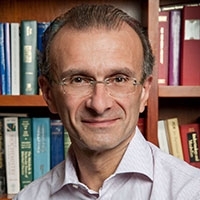The Naomi Berrie Diabetes Center was founded by a diabetic, philanthropist Russell Berrie and supports a unique combination of researchers and clinicians. I have traveled as far as North Carolina (Duke Diet and Fitness Center) to treat my type 2 diabetes so I was pleased to learn that the Berrie Center was located near my home in New York City. According to the Center's website: "Everything about research at the Center is dedicated to shrinking the gap between scientific research and its practical application--so as to raise the prevention, diagnosis, and treatment of Type 1 and Type 2 diabetes to new levels."
A doctor's time is precious and they aren't often able to discuss medical topics with laypeople. Since I write and speak frequently about diabetes, I recently had the good fortune to sit down with Dr. Domenico "Mimmo" Accili, the Russell Berrie Foundation Professor of Diabetes at Columbia University Medical Center.
Dr. Accili is a scientist, and while we discussed his research, for me the most impactful part of our conversation was about prevention rather than treatment. "One in three Medicare dollars is spent to care for diabetics," explained Dr. Accili, "so taking the best care of yourself is very important. Delivering treatment to diabetics is not the challenge, people need to talk to one another about the disease," he said. "Compared to the magnitude of the problem, we don't talk about it enough."
When you're told you have cancer the reaction is immediate and the patient's behavior is always proactive. As Dr. Accili explained, "Diabetes is often not tangible like other diseases so the patient does nothing, even though the disease is gnawing at you. For a type 2 diabetic a strict diet and good exercise is often the best medication against the disease."
"Preventive medicine versus reactive is bigger than just diabetes and is something we must address," said Dr Accili. "The Berrie Center sees 14,000 patients a year. (11,000 of these patients are type 2 and 3,000 are type 1, yet we have not even begun to make a dent into the diabetic population of New York. If we can effectively intervene against obesity we could help so many more of these patients with their diabetes."
According to Dr. Accili, a 5% loss of total body weight can have such a dramatic affect it could result in a 40% decrease in your lifetime risk of becoming a diabetic. If you already are a diabetic, losing weight will help you manage it better. Prior to being diagnosed with diabetes, I exercised regularly but knew nothing about a proper diet and this led to obesity and ultimately diabetes.
Prevention is paramount at the Berrie Center. Besides endocrinologists, cardiologists, and ophthalmologists the Berrie Center also has nutritionists to help patients with their diets as well as a kitchen where diabetics can learn how to prepare healthy meals. Before one even becomes a patient at the Berrie Center the first thing they do is sit through a class where you're taught about the prevention and management of diabetes. The Center offers supermarket tours to teach patients about carbohydrate and sugar content in foods. You then meet with a nutritionist and go on to see a doctor. Not all of this is covered by insurance so in providing these extensive services the Berrie Center incurs substantial losses. This brings us again to the subject of prevention. It's ironic that health insurance, Medicaid and Medicare will help towards the cost of dialysis but not for preventative treatment that could avert the kidney disease that eventually requires such extreme treatment.
Dr Accili believes we need three pillars of society to treat diabetes: education, prevention and research for better treatment. "People know smoking is bad for them and that certain foods will raise their cholesterol," he said. We don't have anything similar for diabetes. A sugared beverage is one of the worst things that can happen to your pancreas but look at how many people drink them, because they don't understand the consequences." We both agreed that limiting the size of a sugared beverage in a fast food restaurant will not help people. "It's hard to legislate good habits," said Dr. Accili. "It has to be learned that obesity and diabetes are manageable through prevention, but they are very hard to treat."
Sharing information with others is clearly an effective way to help people. My mission as a diabetic is to learn as much about prevention as possible, and as Dr. Accili advised, keep talking to people.
